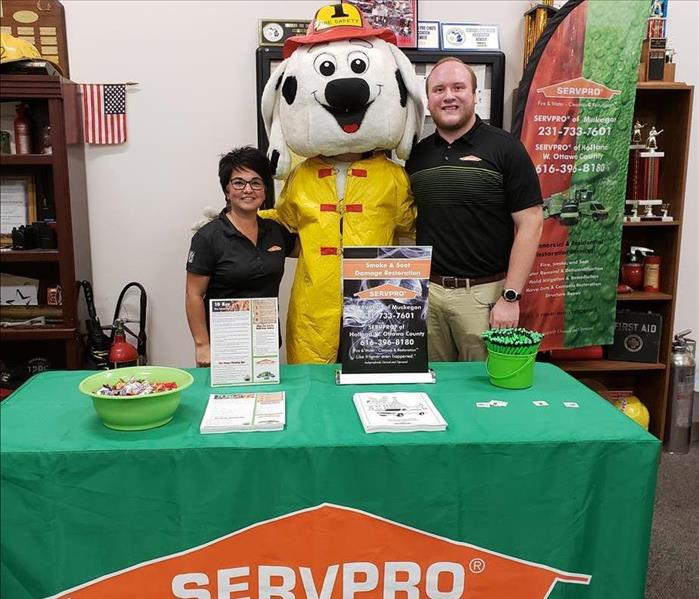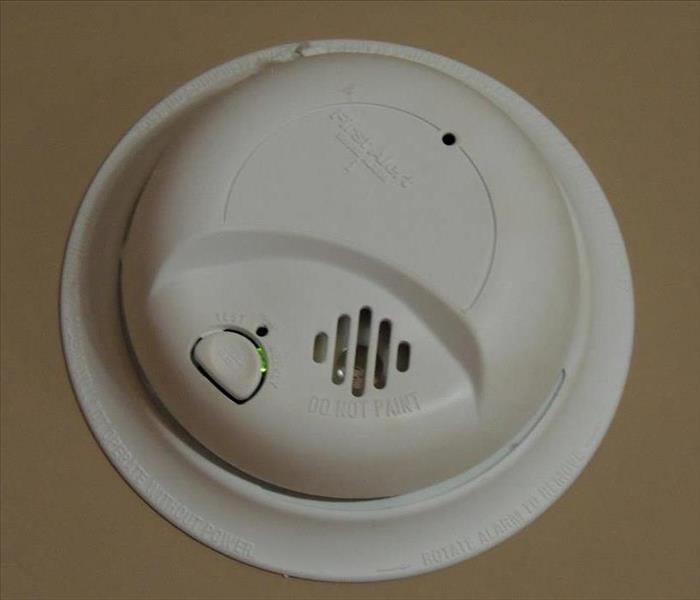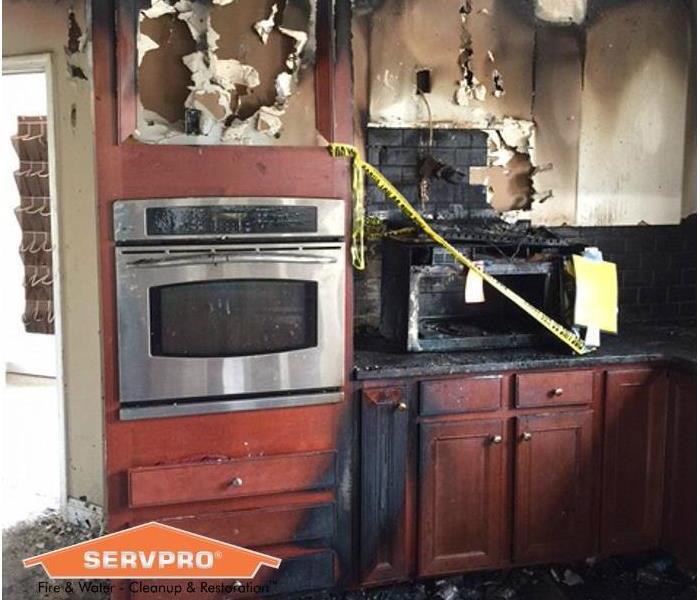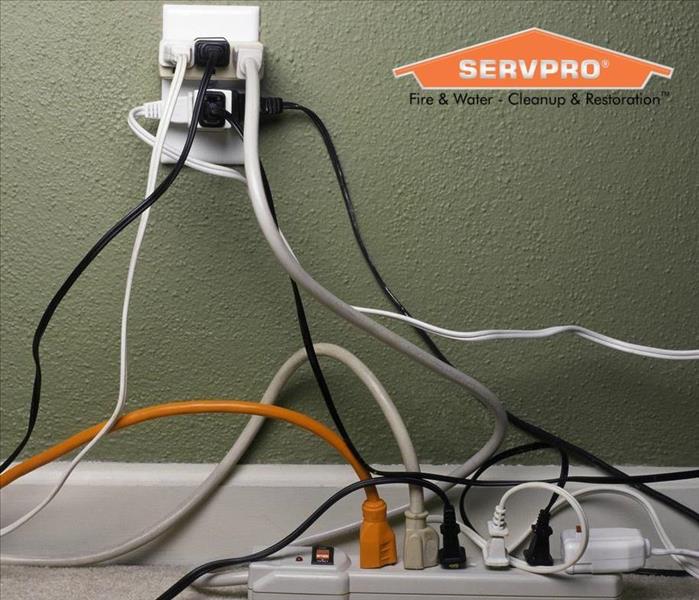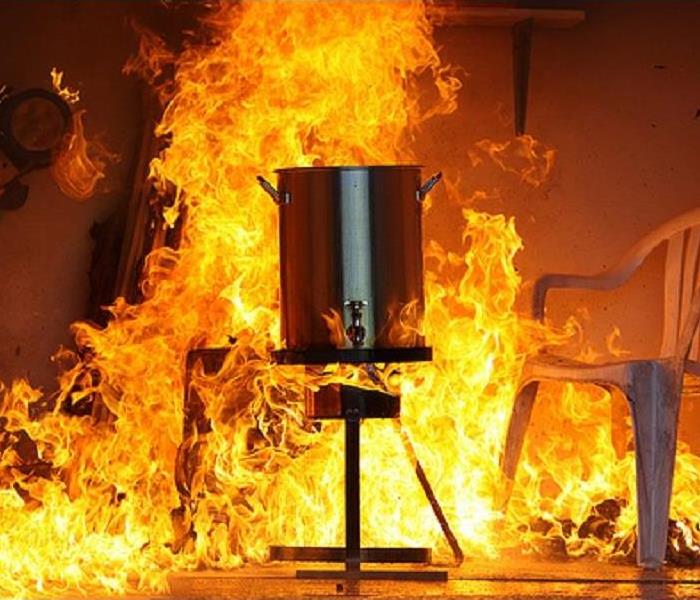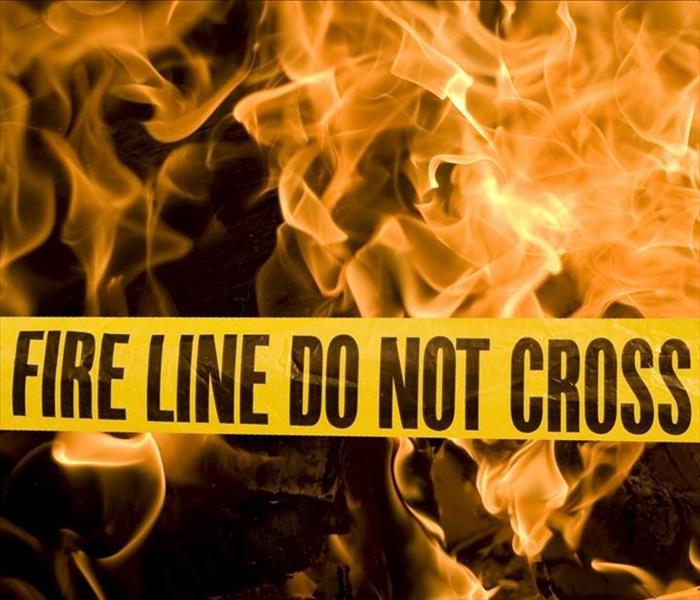Recent Fire Damage Posts
PSA For Old Victorian Homeowners!
4/11/2024 (Permalink)
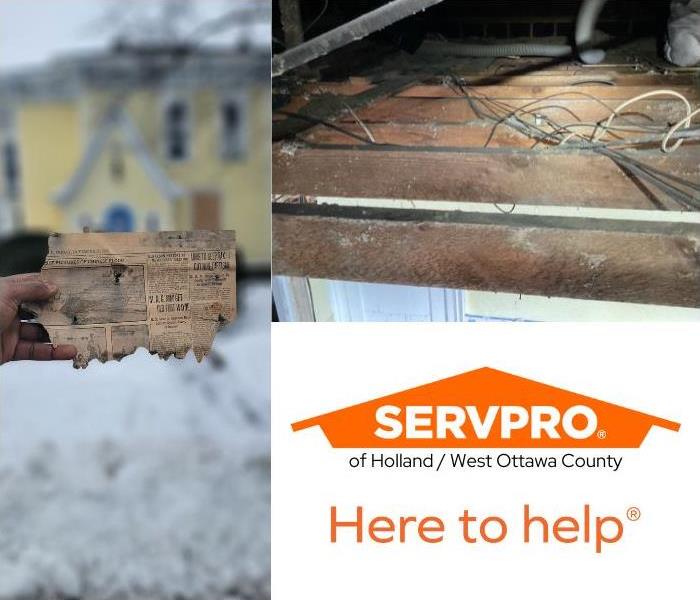 Make sure the wiring in your home is up to code.
Make sure the wiring in your home is up to code.
Old Victorian homes have so much beauty and character but come with many quirks if renovations have not been done throughout the years. This beautiful Victorian was built in 1877 with the oldest type of wiring system that can be found in a home, knob-and-tube. This type of wiring becomes dangerous when the wire insulation has worn away, when installation practices were poor, or when covered with building insulation. One of these knob-and-tube wires was the source of the fire damage in this home.
If your home has older wiring, have a licensed electrician look for any possible hazards to minimize the risk of your home suffering fire damage.
If fire or smoke damage affect your home, call SERVPRO of Holland / West Ottawa County for an inspection and assessment, 616-396-8180. We are trained in fire damage restoration and are always Here to help®
Outdoor Fire Pit Safety For Your West Olive, MI Home
6/1/2023 (Permalink)
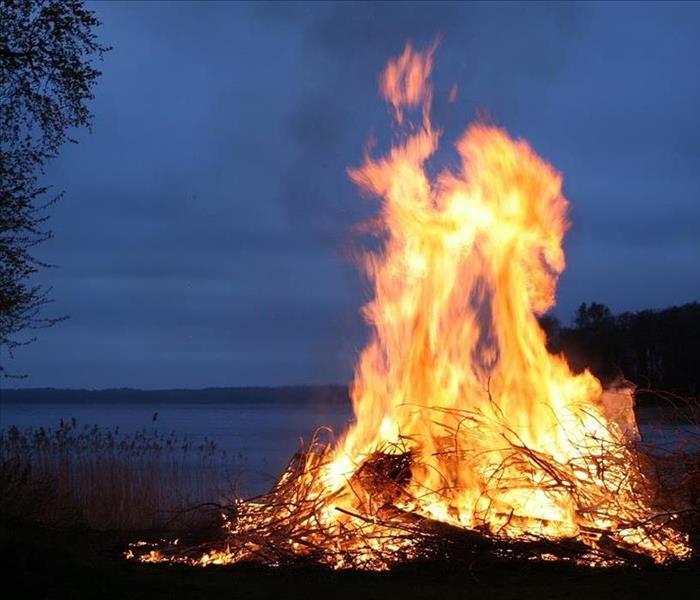 Be safe this summer!
Be safe this summer!
Summer weather is here, which means backyard barbeques and bonfires. Before lighting up an inferno, check out these fire pit safety tips to keep you and your West Olive home safe.
- Check wind conditions - before setting a blaze to your fire pit, check the local weather conditions. Do not use your fire pit if it is unusually windy, which can make it difficult to light the kindling or could blow sparks to surrounding brush or structures, potentially starting a fire.
- Build the fire in the open - never light your fire pit when it is underneath the overhang of a building or beneath trees. Make sure to keep the immediate surrounding area clear of yard waste and other flammable materials. Sparks can blow out of the fire and ignite nearby structures, dry wood, or leaves, which could lead to a fire emergency.
- Never burn construction lumber - to fuel your fire, use wood from around your home or seasoned hardwood kindling and logs. Never use construction materials such as plywood, MDF, pressure-treated boards and posts, or chemically treated wood pallets. These are treated with chemical resins, adhesives, and other substances that emit toxic fumes when burned.
- Be ready to extinguish flames - keep a fire extinguisher, garden hose, or bucket of water nearby to extinguish the fire in case of an emergency. A shovel is handy as well to smother the flames by throwing dirt on them.
- Never leave a fire unattended - even when the fire has died down and only glowing embers remain, do not leave your fire unattended. Tiny flames are still a potential threat as they can rekindle a fire. Make sure to pour water over live embers and turn logs to make sure all sides have stopped burning.
If your home experiences fire damage, call SERVPRO of Holland / West Ottawa County, we are Here to help®, 616-396-8180
Preventing a Garage Fire at Your Spring Lake, MI Home
6/10/2022 (Permalink)
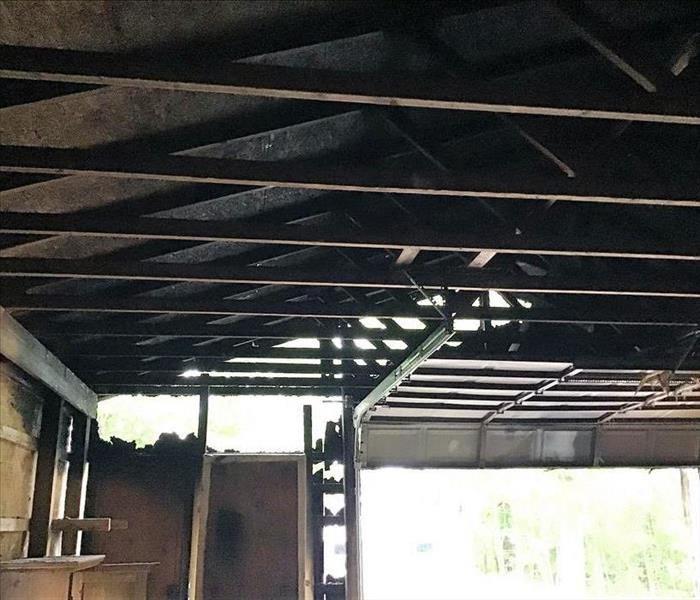 This Spring Lake home was part of the statistic.
This Spring Lake home was part of the statistic.
According to the U.S. Fire Administration and FEMA, there are 6,600 garage fires in homes every year, with the leading cause as electrical malfunction. The following are some prevention tips to keep your Spring Lake home safe from a garage fire:
- Store oil, gas, paint, propane, and varnishes in a shed or building away from your home.
- Keep items that can burn on shelves away from appliances.
- Plug only one charging appliance into an outlet.
- Do not use an extension cord when charging an appliance.
- Install:
- A 20-minute fire-rated door that is self-closing and self-latching from the garage into the house.
- If you have living space above the garage - a ceiling made with 5/8-inch Type X gypsum board.
- If a wall attaches the garage to your home - a wall with 1/2-inch gypsum board.
- If you have attic access from the garage - an attic hatch cover.
- A heat alarm, not a smoke alarm, in your garage. The heat alarm will sound if the temperature rises too high.
If your home has experienced a garage fire, call SERVPRO of Holland / West Ottawa County today for an estimate, 616-396-8180
Pet Loving Ferrysburg, MI Residents - Fire Evacuation Plan For Your Home
5/31/2022 (Permalink)
 Pets are a part of our families; make sure to include them in your fire evacuation plan.
Pets are a part of our families; make sure to include them in your fire evacuation plan.
According to the American Pet Products Association (APPA) 2021-2022 National Pet Owners Survey, seventy percent of U.S. households, or about 90.5 million families, own a pet. During a fire, your first priority is to get yourself and your family members our safely. Having a fire evacuation plan helps to keep you and your family a little more calm; and since our pets are a part of our families, don't forget to add them into your plan.
Preparation is key when it comes to protecting your pets in a fire. In case your pets are in an unsafe location that you or a family member can't get to during a fire, there are several things that you can do to better the chance of your pets rescue:
- Keep your pet in a room or area that is easily accessible to fire fighters.
- Update your pet alert window cling on the front window of your home.
- Put together a disaster supply kit just for your pets, including medications, food, and other dog supplies.
- Place important pet ownership documents and proof of vaccinations in a fire safe box that you can easily retrieve.
- Teach your pets the "Come" command so you can easily direct them towards you in an emergency.
If your Ferrysburg home has experienced a fire, call SERVPRO of Holland / West Ottawa County for an estimate, 616-396-8180. We are Here to help®
Power Bank Explosion in Grand Haven, MI Home
4/15/2022 (Permalink)
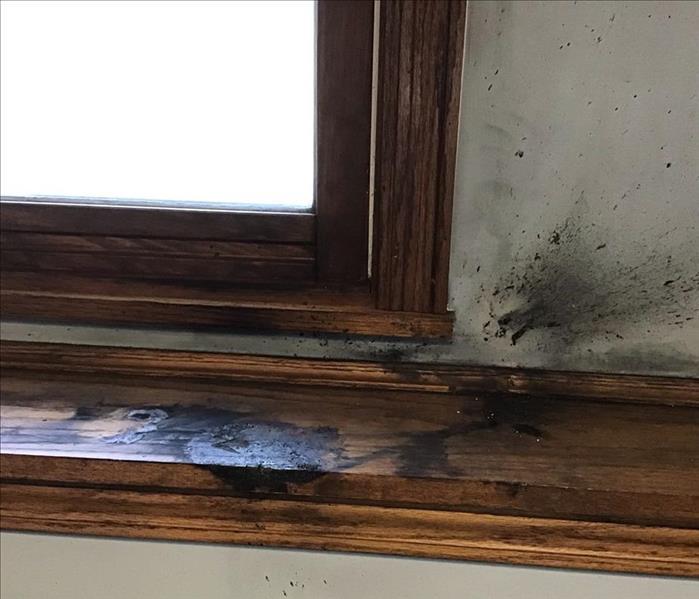 This burned windowsill and wall was caused by a portable power bank that exploded.
This burned windowsill and wall was caused by a portable power bank that exploded.
Our electronics, such as cellphones and tablets, are our lifelines. That's why demand for portable power banks has increased throughout the years, and can be found in many homes. This homeowner in Grand Haven did not realize that not all power banks are created equal and they can be very disastrous. While charging on the windowsill it exploded, catch fire, and then caught a second one on fire that was nearby. Luckily they were able to act fast to douse the fire before more damaged happened.
Poor circuit design is a main reason for explosions in power banks, as they are built with Li-ion batteries. Make sure to buy your power banks from a trusted brand and supplier. The following are some ways to prevent an explosion from happening:
- Keep your power bank cool - place in a cooler place, especially in the warmer months
- Do not overcharge your power bank - when it is full, disconnect it
- Do not charge your power bank when no one is home
- Do not drop, bump or squeeze your power bank - this may cause misalignment with internal parts or battery leakage
- Discard your power bank if it shows any signs of malfunction - bulging is a malfunction, dispose of safely (not in the trash) immediately
If your home or business has experienced a fire, big or small, call SERVPRO of Holland / West Ottawa County, 616-396-8180. We are Here to Help®
How To Prevent A Furnace Puff Back In Your Nunica Home
2/10/2022 (Permalink)
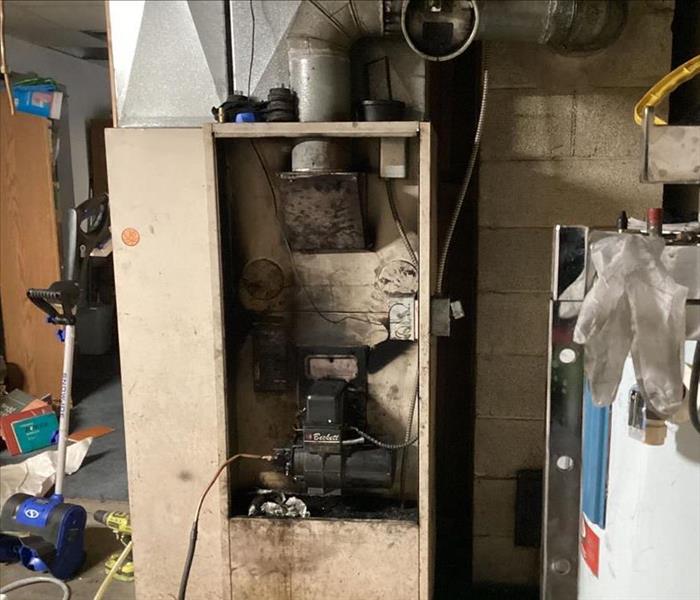 This Nunica home recently suffered damage throughout their home due to a furnace puff back.
This Nunica home recently suffered damage throughout their home due to a furnace puff back.
A puff back happens when an oil burning furnace does not ignite right away. Oil vapors build up in the ignition chamber, which causes an explosion when the igniter finally does trigger. The explosion blows soot and other debris through the furnace's exhaust system and into the heating system, carrying it into the home. If the furnace is connected to a forced air heating system, the ducts can carry the puff back to every room in the home with a vent open.
Common Reasons For Puff Backs:
- Leaks in the oil supply piping
- Heater shutdown problems
- Clogged or damaged oil spray nozzle
- Issues with chimney or heater installation
- Problems with combustion gas venting
Preventing Puff Backs:
- Know the warning signs - oil leaks, loud startup, noise after shutoff, sooty operation, strange odors
- Address problems immediately
- Have your heating system serviced on a regular basis
If your Nunica home was experienced a furnace puff back, call SERVPRO of Holland / West Ottawa County. We have the training and expertise to help make your damage "Like it never even happened.", 616-396-8180
National Burn Awareness Week
2/4/2022 (Permalink)
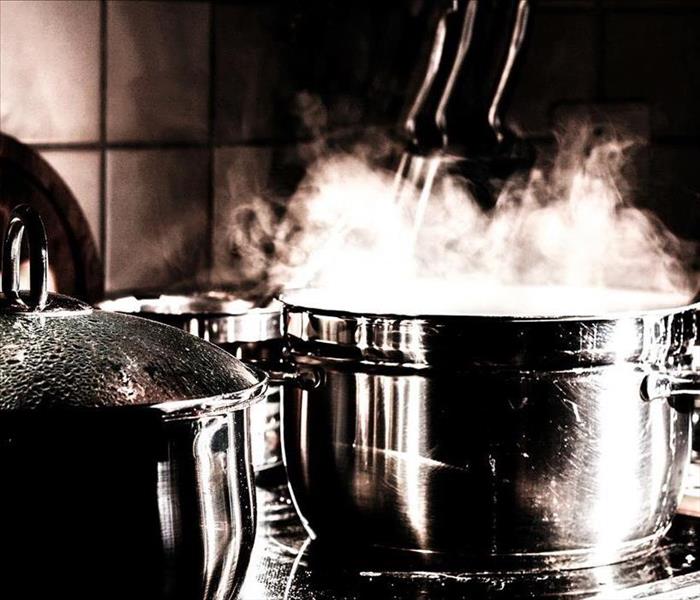 Keep you and your family safe with these cooking tips.
Keep you and your family safe with these cooking tips.
The American Burn Association has set aside the first full week in February as National Burn Awareness Week (NBAW). The 2022 theme is Burning Issues in the Kitchen. Cooking is the number one cause of residential fires in the United States, and the American Burn Association reports 47% of all home fires are caused by cooking. The following are a few tips to keep you and your family safe while cooking in your West Olive home:
- The best time to cook is when you are wide awake, and not drowsy from medication or alcohol.
- Keep a pan lid and dry potholders or oven mitts near you every time you cook.
- When heating food in the microwave, only use microwave-safe cookware that allows steam to escape and allow food to rest before removing it from the microwave.
- Stay in the kitchen while you are frying, grilling, or broiling food. If you leave, turn off the stove.
- After cooking, check the kitchen to make sure all burners and other appliances are turned off.
Experienced fire damage to your West Olive home from a cooking fire? Call SERVPRO of Holland / West Ottawa County, 616-396-8180, we are Here to Help®
Allendale Smoke and Soot Cleanup
9/21/2021 (Permalink)
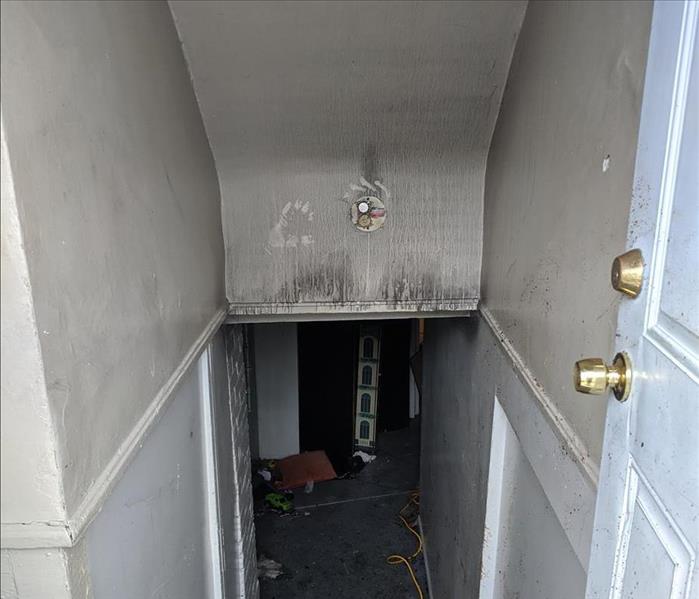 Smoke and Soot Damage Can Cause a Prevalent Odor in Your Allendale Home.
Smoke and Soot Damage Can Cause a Prevalent Odor in Your Allendale Home.
Smoke and soot is very invasive and can penetrate various cavities and crevices within your Allendale home, causing hidden damage and odor. Our smoke damage expertise and experience allows us to inspect and accurately assess the extent of the damage to develop a comprehensive plan of action.
Smoke and Soot Facts:
- Hot smoke migrates to cooler areas and upper levels of a structure.
- Smoke flows around plumbing systems, seeping through the holes used by pipes to go from floor to floor.
- The type of smoke may greatly affect the restoration process.
Different Types of Smoke
There are two different types of smoke - wet and dry. Because of this, there are different types of soot residue after a fire. Before restoration begins, SERVPRO of Holland/West Ottawa County will test the soot to determine which type of smoke damage occurred. The cleaning procedures will then be based on the information identified during pretesting.
- Wet Smoke - Plastic and Rubber: low heat, smoldering, pungent odor, sticky, smeary. Smoke webs are more difficult to clean.
- Dry Smoke - Paper and Wood: fast burning, high temperatures, heat rises therefore smoke rises.
- Protein Fire Residue - Produced by Evaporation of Material Rather Than From a Fire: virtually invisible, discolors paints and varnishes, extreme pungent odor.
Our Fire Damage Restoration Services
Since each smoke and fire damage situation is different, each one requires a unique solution tailored to the specific conditions. SERVPRO of Holland/West Ottawa County has the equipment, expertise, and experience to restore your home. We also treat your family with empathy and respect, and treat your property with care.
Has your home been affected by smoke or soot damage? Call SERVPRO of Holland/West Ottawa County today, 616-396-8180
Top Fire Hazards In Your Holland Home
6/11/2021 (Permalink)
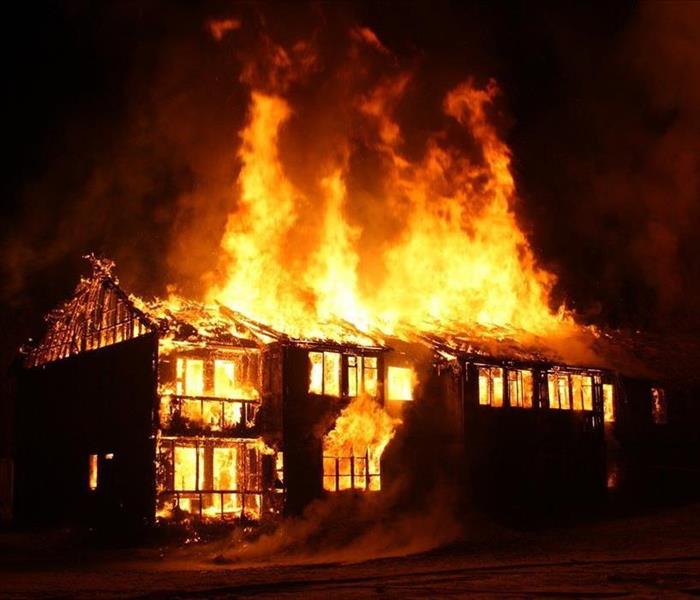 Be aware of the top fire hazards in your home.
Be aware of the top fire hazards in your home.
Our home, the place we feel safest. To stay safe in your residence, check out these top fire hazards that can potentially happen in your Holland home.
- Electrical Outlet Issues - the top cause of house fires in the United States stems from issues with electrical outlets. We are currently using more electronic devices than ever and are most times using too many on a single outlet. To help prevent fires, be sure not t exceed your voltage on a single outlet in your home.
- Outdated Home Wiring - household wiring should be checked routinely to avoid circumstances that trigger major fire damage in your home. Oftentimes wiring that is outdated, worn, or even compromised from animals can cause fire hazards in and outside your home.
- Decorative Lights - be sure to take the proper precaution when using decorative lights including outside lights, plugs, surge protectors, extension cords, and turning off lighting when you are not around to minimize risks.
- Hair Products - never forget to unplug styling products. Make sure that your curling iron and hair dryers are off and placed on heat proof material to help reduce the chances of a fire.
- Toasters - proper care of your toaster can help to prevent house fires. Crumbs inside the toaster can be dangerous as they can cause sparks, which can lead to hazardous problems in the kitchen. Make sure to clean your toaster regularly.
- Candles - the ambiance and smell of candles are pleasant, however, you need to be cautious where you place them and be sure to put them out prior to going to bed or leaving. When using candles, always use a holder that prevents them from falling over, and set them on a flat surface or table.
- Washers and Dryers - washers and dryers are a leading cause of fires in homes. Routine maintenance and cleaning can help prevent fires. Make sure to clean the filters and vents inside and outside.
- Smoking - if you or someone in your home is a smoker, try to do so outside. Always keep lighters and matches out of reach of children.
- Dust in Electric Sockets - dust can pile inside electrical sockets, and if not cleaned regularly, may ignite and result in a fire. Use a can of compressed air to blow dust out of the outlet and surrounding area.
- Electric Blankets - electric blankets do wonders to keep us warm during colder months but they can cause fires. Be sure to use a blanket that doesn't have too much wear and tear. When not in use, do not fold the blanket as it helps to prevent electrical issues that can lead to a fire hazard.
If you experience a fire in your home, do not hesitate to call SERVPRO of Holland/West Ottawa County. We are Here to Help, 616-396-8180
How to Prevent an Oven Fire in Your Zeeland Home
6/1/2021 (Permalink)
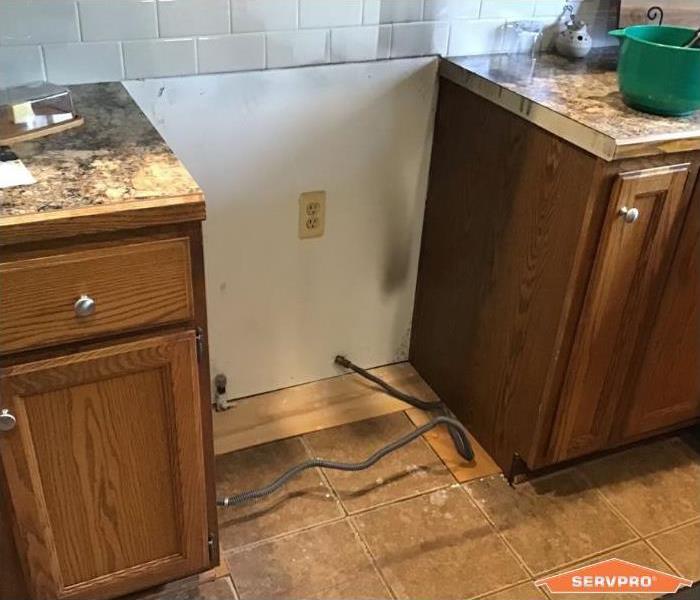 This soot covered kitchen was caused by an oven fire.
This soot covered kitchen was caused by an oven fire.
This homeowner in Zeeland feel victim to an oven fire. Luckily they were able to contain the fire to the oven, but smoke and soot traveled throughout the entire home. Here are some common mistakes that could catch your oven on fire:
- Placing Greasy Food Too Close to Heat Fat (i.e. cooking oil) too close to a heating source can spark a flame. Make sure to keep generously oiled foods, especially those that have a high moisture content, on lower oven racks when broiling.
- Using Wax Paper Instead of Parchment Paper There is a big difference between wax paper and parchment paper when cooking. Wax paper is not heat-resistant the way parchment paper is, so it will most definitely melt when exposed to prolonged, high heat and then he paper can easily catch fire. Oven-safe parchment paper may darken in the oven, but will not catch fire.
- Dropping Food in the Oven It is crucial to always clean up any food that may have dropped to the bottom of your oven. Leftover bits may catch fire, or at least burn and smoke at the base of your oven. Larger pieces of dry food, such as a baguette, may even catch fire instantly. Always place loose food items on a baking sheet, and check your oven for food pieces before and after each use.
- Forgetting to Use a Baking Sheet A very common mistake is forgetting to place a baking sheet under dishes to avoid dripping. Pies and pizzas should be baked either directly on a baking sheet or with a baking sheet on the rack beneath to catch any drippings.
- Leaving Your Food Unattended Whenever you leave food unattended, you're at risk for it to burn or you may forget how long it's been cooking. Always keep an eye on food you're cooking and set a timer as a reminder.
If a fire does break out in your oven, the most important thing to remember is to keep the door closed, turn off the oven, and keep an eye on the flame. This will keep the fire contained and should die down.
Have you experienced an oven fire? Call SERVPRO of Holland/West Ottawa County today, 616-396-8180
Clothes Dryer Fire Safety for your Robinson, MI Home
4/16/2021 (Permalink)
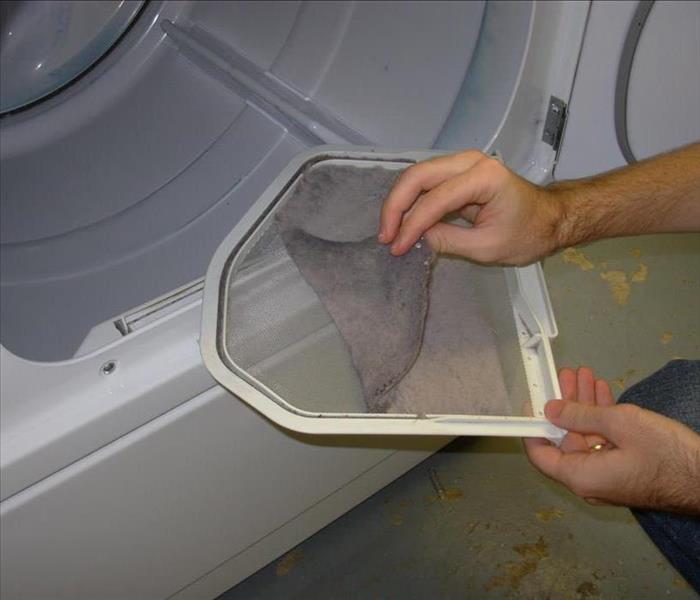 Check out these clothes dryer fire safety tips.
Check out these clothes dryer fire safety tips.
Laundry is routine for many households; but did you know that 2,900 home clothes dryer fires are reported each year with the leading cause being failure to clean the dryer? Follow these safety tips from FEMA and the U.S. Fire Administration to prevent a clothes dryer fire in your Robinson home.
- Have your dryer installed and serviced by a professional.
- Do not use the dryer without a lint filter. Clean the lint filter before and after each cycle.
- Do not forget to clean the back of the dryer where lint can accumulate.
- Check the venting system behind the dryer to make sure that it is not damaged, crushed, or restricted.
- Make sure that the outdoor vent covering opens when the dryer is operating.
If your home experiences a clothes dryer fire, call SERVPRO of Holland/West Ottawa County to make it "Like it never even happened," 616-396-8180
Electrical Safety
2/22/2021 (Permalink)
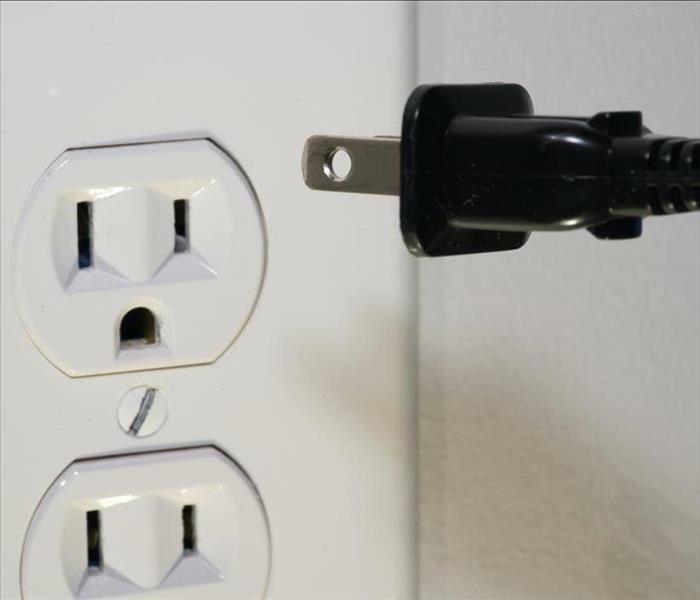 Be fire smart with electricity in your home
Be fire smart with electricity in your home
Electricity helps make our lives easier but there can be times when we take its power and its potential for fire-related hazards for granted. According to the National Fire Protection Association (NFPA), there are approximately 45,000 home electrical fires each year with half of them involving home wiring or lighting equipment. Peak months for electrical fire deaths are November through March with peak times between midnight and 8:00am. The following are a few tips to be fire smart with electricity in your home:
- Plug only one heat-producing appliance (like a coffee maker, space heater, or microwave) directly into a wall outlet at a time.
- Never use an extension cord with a heat-producing appliance.
- Extension cords should only be used temporarily. Have an electrician install wall outlets where you need them.
- Major appliances should be plugged directly into a wall outlet. Do not use extension cords or plug strips.
If you experience fire damage from an electrical fire, SERVPRO of Holland/W. Ottawa County is Here to Help! Call us today, 616-396-8180
Content Restoration Cleaning After Fire Damage
2/19/2021 (Permalink)
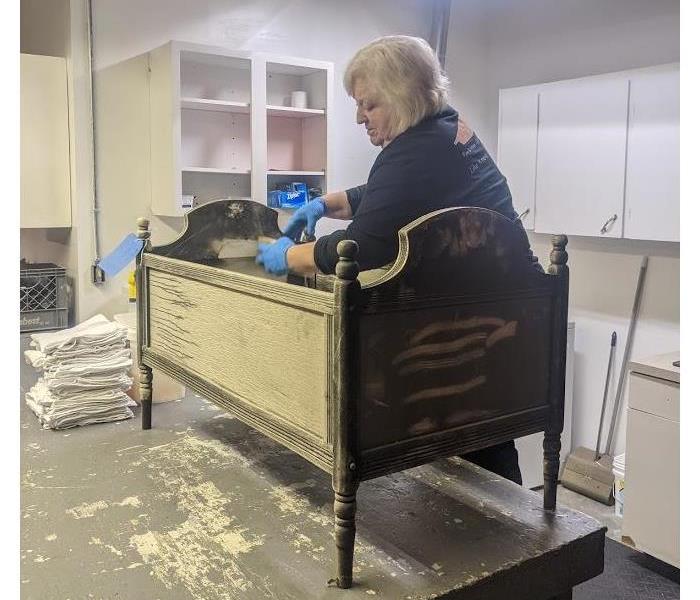 SERVPRO of Holland/W. Ottawa County takes pride in restoring your belongings
SERVPRO of Holland/W. Ottawa County takes pride in restoring your belongings
Fire damage, including smoke and soot, affects not only the structure of your house but also your belongings. SERVPRO of Holland/W. Ottawa County Professionals understand your family's furniture, clothing, keepsakes, and other belongings are the things that make your house a home.
Our expertise and "restore" versus "replace" mentality can help you save money while preserving precious keepsakes that can't be replaced, such as the antique baby crib in the photo. We pretest your belongings to determine what items can be restored to pre-fire condition and use several methods of cleaning, including:
- Dry Cleaning - Used for cleaning light residues or to pre-clean prior to wet cleaning.
- Wet Cleaning - An effective cleaning technique for removing moderate to heavy residues.
- Spray and Wipe - Effective for items that cannot withstand wet cleaning.
- Foam Cleaning - Used for upholstery fabrics that might shrink or bleed if wet cleaned.
- Abrasive Cleaning - Involves agitation of the surface being cleaned.
- Immersion Cleaning - Contents are dipped into a bath of the cleaning product.
If you have questions or need help restoring your belongings, call SERVPRO of Holland/W. Ottawa County today, 616-396-8180
Winter Safety Tips
2/5/2021 (Permalink)
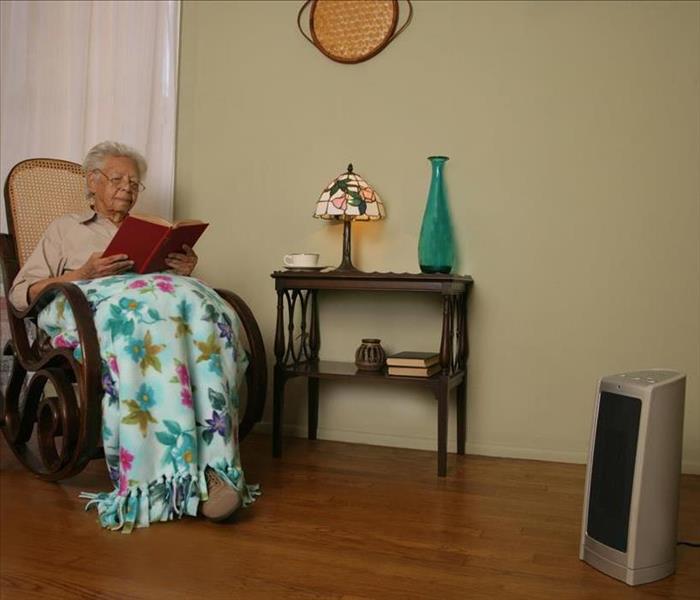 SERVPRO of Holland/W. Ottawa County is Here to Help 24/7
SERVPRO of Holland/W. Ottawa County is Here to Help 24/7
Did you know that half of all home heating fires occur in December, January and February? 1 in every 7 home fires and 1 in every 5 home fire deaths involves heating equipment. The following are a few tips from the U.S. Fire Administration to help prevent you from becoming a part of the statistic:
- Have a qualified professional clean and inspect your chimney and vents every year.
- Store cooled ashes in a tightly covered metal container and keep it outside at least 10 feet from your home and any nearby buildings.
- Plug only 1 heat-producing appliance (like a space heater) into an electrical outlet at a time.
- Keep anything that can burn at least 3 feet from any heat source like fireplaces, wood stoves, radiators or space heaters.
- Turn space heaters off when leaving the room or going to bed.
- Keep portable generators outside, away from windows, and as far away from your home as possible.
- Install and test carbon monoxide alarms at least once a month.
If you have experienced a fire in your home, call SERVPRO of Holland/W. Ottawa County today, (616) 396-8180
Fire Prevention Month
9/29/2020 (Permalink)
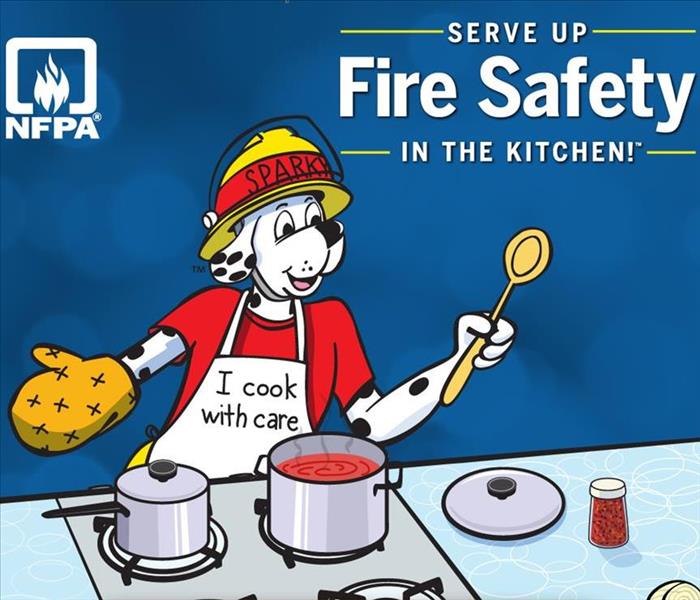 Are you cooking with care?
Are you cooking with care?
October is Fire Prevention Month which The National Fire Protection Association (NFPA) sets aside a designated week each October to focus on fire prevention. The 2020 theme is, "Serve Up Fire Safety in the Kitchen!" October 4th-10th. Cooking is the number one cause of home fires according to NFPA; while unattended cooking is the leading cause of fires in the kitchen. Once a fire alarm goes off you could have less than two minutes to get out safely, depending on the extent of the fire, yet only eight percent of people surveyed by NFPA said getting out was the first thought they had after hearing a fire alarm go off. A fire escape plan for your home or business could be the difference between safety and devastation.
Gas Stove Safety
6/15/2020 (Permalink)
If you still use a gas stove in your home, then you probably know how dangerous they can be. Any source of open flame indoors creates a fire hazard and requires extra precautions. Here are some safety tips for gas stoves:
- Managing the flame. Only have the stove on when something is cooking.
- Maintaining the stove. Clean the stove on a regular basis to prevent food buildup.
- Using the right utensils. Be sure to only use stuff that is designed for stove use.
- Monitoring carbon monoxide. Gas stoves produce carbon monoxide so provide plenty of ventilation and install detectors around the home.
- Be tentative when cooking.
- Always be on the lookout for gas leaks.
- Keep flammable objects away from the stove.
- Have emergency equipment and services such as a fire extinguisher nearby.
- Be aware of personal precaution such as not wearing baggy clothes.
- Install smoke alarms throughout the home.
- Install a range hood for proper ventilation.
When it comes to fire hazards, you can never be too safe.
Cleaning Your Fireplace
6/3/2020 (Permalink)
Now that most homeowners are no longer using their fireplaces, it may be time to clean it out! Here are some tips on how to properly clean your fireplace:
- If you have had a fire recently, you need to wait until your fireplace has cooled completely. It is best to wait a full day to be sure.
- Once the fireplace is cool, spread a large towel or old sheet at the base of the fireplace. This will keep ash from getting on your carpet or floor. It may be a good idea to cover nearby furniture as well.
- Use a handheld broom to sweep up ash and soot and gently place it into a waste bin. Be careful not to let ash fly everywhere.
- It is a good idea to vacuum the carpet and nearby furniture to remove any ash that may have escaped.
When cleaning your fireplace, it is best to wear old or dirty clothes. Even though it may be another chore on the list, take your time for best results!
Campfire Safety
4/23/2020 (Permalink)
The weather is finally warming up enough to make having a campfire enjoyable. Although most people enjoy having a fire on a nice cool evening, it also brings along a variety of dangers. We have worked many residential fire damage jobs over the years that were the result of people not taking proper precautions when having a fire. Between structural, soot, smoke, and possibly water damage, the restoration job can get costly very quick. It is very important to be cautious when having a fire. Here are some tips that could help you avoid a disaster:
- Dig a pit away from overhanging branches
- Clean a 10-foot area around the pit with dirt, removing anything that could catch fire
- Keep a bucket of water and shovel nearby
- Do not pull sticks out of the fire
Have Questions about Fire, Smoke, or Soot Damage?
Call Us Today – (616) 396-8180
Dryer Fires
2/24/2020 (Permalink)
Doing laundry is a weekly chore for most people in the US. Unfortunately, making sure our appliances are well maintained is something that is often overlooked. Clothes dryers are one of the most dangerous appliances that you own and account for almost 3,000 fires each year in the US. There are multiple reasons a dryer can catch fire; however, the most common reason is failure to clean and properly maintain it. You should clean your dryer annually and perform inspections of the hose and vent for any blockages twice a year. Be sure to clean the lint filter before and after each load of laundry. Lint and dust is very flammable and can easily catch fire when exposed to extreme heat. If you have not serviced your dryer recently, it should be high on your priority list.
The Dark Side Of Candles
2/24/2020 (Permalink)
Most people enjoy the presence of candles in their home but do not consider how dangerous they can be. Not only do they pose a fire hazard, but they also have the ability to leave your home filled with soot. Soot has the ability to coat your walls, carpet, furniture, blinds, drapes, contents, and more. There are a few ways you can prevent soot damage from a candle:
- Ensure the candle is fully out and not smoldering.
- Seek higher quality candles with minimal impurities.
- Trim wicks to 1/4 inch.
- Open windows regularly to ventilate your home.
Our technicians have extensive experience cleaning soot off both structure and contents. If you have fallen victim to soot damage, give us a call!
Have Questions about Fire, Smoke, or Soot Damage?
Call Us Today – (616) 396-8180
Puffback Season
10/7/2019 (Permalink)
If you are a homeowner, you are probably familiar with puffbacks. A puffback occurs when a furnace or boiler does not ignite properly and allows oil or gas vapors to build up in the ignition chamber. When it finally ignites, this creates a puffback and can blow smoke throughout your home. There are a variety of different things that can cause a puffback:
- A leak at or near the combustion chamber
- A clogged exhaust or chimney
- A cracked heat exchanger
- Manually resetting the system too often when it fails to ignite
- A damaged oil fuel nozzle
- A clogged burner
The messiest form of puffbacks tend to be forced air, oil-fired heating systems. Oil creates more soot than gas, and the ductwork for the forced air system can spread that soot to every room in the home. If you experience a puffback, do not attempt to clean it yourself. Our technicians have the equipment and experience necessary to successfully clean your home without doing further damage.
Candle Safety
10/7/2019 (Permalink)
With the holidays rapidly approaching, many homeowners are starting to break out their favorite candles. Who doesn't enjoy a nice fall night with the smell of pumpkin spice in the air? Although candles are nice to have, they bring about fire concerns as well. Here are three primary safety tips for candles:
- Never leave a burning candle unattended.
- Never burn a candle on or near anything that might catch fire.
- Keep candles out of reach of children and pets.
If for any reason you have to leave the home, make sure that all candles are blown out before departing. A knocked over candle has the ability to easily start a house fire. Take caution when using candles and have a fun and safe holiday!
Home Fire Safety
8/5/2019 (Permalink)
Having you checked your smoke alarms recently? If you are somebody who has never experienced a house fire, it is easy to forget that smoke alarms should be checked on a regular basis. It is suggested that smoke alarms be tested every month and replaced every 10 years. Make sure that there is a smoke alarm in every bedroom and outside sleeping areas. If a fire occurs, it is very important that everybody in the house knows what the alarms sound like and what they should do. Be sure to inform children that it is very important that the first thing they do is get outside and stay outside. The lack of a plan can easily result in panic and confusion which can lead to a dangerous situation. Ensure the safety of your family by investing the time and money in protecting them should a house fire occur.
Post-Fire Odors
6/27/2019 (Permalink)
House fires are not as uncommon as many may think. Anything from an electrical shortage, tipped over candle, space heaters, and more can result in a devastating experience. Although many fires can be caught early with minimal structural damage, they can still result in heavy smoke and soot damage. The odor left behind from even a minor fire can be overwhelming. Luckily, we are here to help. Our technicians have the experience and equipment to restore your home to pre-fire condition. The longer smoke/soot/odor damage remains in your home after a fire, the more difficult it will be to restore it. If you experience a fire and are in need of restoration/deodorization, do not hesitate to call. We can make it "Like it never even happened."
SERVPRO of Holland/W. Ottawa County: 616-396-8180
Smoke Alarm Safety
5/6/2019 (Permalink)
If there is one thing that many of us do not set as a priority on our "To-Do" list but should, it is checking our smoke alarms. Individuals who have never experienced a house fire do not take preventative measures as seriously as those who have. Smoke alarms that are properly installed and maintained play a vital role in reducing fire deaths and injuries. If there is a fire in your home, smoke spreads fast and you need smoke alarms to give you time to get out. According to the National Fire Protection Association, here are some things you need to know:
- A closed door may slow the spread of smoke, heat and fire. Install smoke alarms in every sleeping room and outside each separate sleeping area. Install alarms on every level of the home.
- Smoke alarms should be interconnected. When one sounds, they all sound.
- Large homes may need extra smoke alarms.
- Test your smoke alarms at least once a month.
- Today's smoke alarms will be more technologically advanced to respond to a multitude of fire conditions, yet mitigate false alarms.
- When a smoke alarm sounds, get outside and stay outside.
- Replace all smoke alarms in your home every 10 years.
Spring Fire Season
3/25/2019 (Permalink)
It is officially that time of the year again. The spring fire season can be very dangerous and not something to be taken lightly. With trees bare and sunlight drying out sticks and leaves, debris burning can easily get out of hand. If your yard is littered with fallen sticks from winter storms, consider waiting until summer to do any controlled burning. With leaves being dried out, they are highly flammable and can easily become airborne if breezy. Flaming leaves that go airborne are very likely to start more fires that may become uncontrollable. Debris burning is one of the most common causes of wildfires according to the United States Department of Agriculture Forest Service. Please obey any fire restrictions and be smart when burning debris.
Overloading Outlets
3/25/2019 (Permalink)
With spring cleaning and remodeling taking place, there is a certain tool that comes in handy when extra outlets are needed: Power strips. Although they are helpful, they can pose a serious fire risk. We are often times not worried about how much power we may be drawing through a single outlet. With many homeowners living in 30+ year old homes, the power outlets are not capable of handling the usage of modern day technology. Major appliances such as dryers, air conditioners, refrigerators, etc. should always be plugged into their own outlet due to their heavy power usage.
Look for these signs that your electrical system may be overloaded:
- Lights flicker or dim
- Circuit breakers trip or fuses blow regularly
- Cords or wall plates are warm or discolored
- Crackling, sizzling or buzzing is heard from outlets
If you notice any of these signs, reduce electrical usage and have your home inspected by a professional. Do not fall victim to an electrical fire.
Chimney Fires
10/16/2018 (Permalink)
It is that time of the year again. As temperatures drop in West Michigan, fireplaces and wood stoves begin to come back into use. That means that chimney fires become a concern for many homeowners. Chimney fires are caused by creosote, a combustible substance that is formed by gases during the burning process. This substance hardens to the chimney liner and poses a serious fire risk. Here are some ways that you can prevent chimney fires:
1. Clean your chimney: It is very important that your chimney is inspected every year. Making sure your chimney is safe and cleaning it when it becomes a possible hazard is a great way to prevent a fire.
2. Use dry wood: If your wood is wet, it will not burn as hot as dry wood and will produce much more smoke. This increase in smoke can lead to an increase in creosote production.
3. Burn the hardest firewood you can find: Softer wood tends to increase the production of creosote in your chimney. This is often due to the amount of pitch in softer wood such as pine.
4. Try to burn at the right temperature: It is best when using a wood stove to have a temperature gauge that ensures you remain in the "burn zone".
5. Use a creosote remover powder: This powder is to be placed on the wood and burned at a high temperature. It helps to turn the creosote that may be forming in the chimney into powder to reduce buildup.
All of these tips can reduce your chances of a chimney fire, but the most important one is the first. Always make sure your chimney is inspected and cleaned regularly to ensure the safety of your household.
Fire Prevention Open Houses
10/11/2018 (Permalink)
As fire prevention open houses are nearing an end for this year, we encourage families to attend at least one in your local area. These events serve as great educational opportunities for individuals of all ages. They have educational material and demonstrations on how you can keep your family safe in case of a fire. These demonstrations include the importance of shutting doors when sleeping, having working smoke detectors, how to escape a burning structure, and more. These events are often attended by other branches of first responders as well, such as law enforcement, ems, etc. that educate individuals on their jobs and what they do to help people each and every day. The open houses are totally free and leave your kids walking away with memories of a lifetime!
Smoke Alarms
8/31/2018 (Permalink)
When it comes to residential and commercial safety, smoke alarms play a huge role. Smoke alarms are very beneficial; however, that is only if they are working. You should test your smoke alarms a minimum of once a month by using the test button. Smoke alarms that have batteries should have the batteries replaced once a year. Smoke alarms that do not have replaceable batteries should have the whole unit replaced every ten years. If smoke alarms begin to chirp, indicating low battery, you should take the proper steps of replacing the batteries or unit. Make sure that smoke alarms are in every room that is commonly occupied in your residential and commercial buildings.
If you are a commercial business owner, ensure that all fire codes in your facility are met. If you are unsure if your building is up to par, contact your local Fire Marshall.
Smoke alarms do not only play a huge part in safety, they also play a huge part in reducing fire damage. The longer a fire burns, the more damage it produces. The sooner you are made aware that a fire has started, the sooner first responders can arrive on scene and prevent further damage. This just gives you all the more reason to make sure that your smoke alarms are where they need to be and working properly.
Destroy Odors with DEODORIZATION
7/6/2018 (Permalink)
Fire, smoke and soot damage in your business or home have the potential to create unpleasant odors for years if the effected areas are not properly cleaned, sanitized and deodorized. When different types of materials burn, the smoke travels throughout the structure leaving residue on surfaces and also in hard-to-reach places. Professional action should be taken quickly before permanent damages to contents occurs from residue and soot deposits.
IICRC Certified technicians at SERVPRO of Holland/W. Ottawa Co. provide specialized services to rid your business or home of odors from a fire or smoke damage. Our technicians seek and remove the source of the odor not by covering it up with a fragrance.
Do you know someone (friend, neighbor, client, customer, family member) that has had a fire, water, mold damage or some other type of odor that refuses to go away? Call SERVPRO of Holland/W. Ottawa Co. and we'll help make it "Like it never even happened."
Smoke Alarms Saves Lives
5/19/2018 (Permalink)
Smoke alarms save lives when they are installed properly, maintained and checked periodically to make sure they are in working order.
In a home, there should be a smoke alarm in every bedroom on every level of the home including the basement. In an office or commercial environment, check with your state requirements or contact your local Fire Marshall to help ensure all the codes are met.
Every month you should use the test button to test the smoke alarms. Smoke alarms with non-replaceable batteries should be replaced every 10 years. Other alarms need batteries replaced every year and the unit replaced every 10 years. Do not ignore the chirp of an alarm battery. That noise is an indication that the battery is low. Take the proper steps to replace the unit or the batteries immediately. Never disable or remove the battery from the alarm. Almost half of fires where smoke alarms were present but did not activate had missing or disconnected batteries (NFPA).
Hard wired or wireless smoke alarms are often used in larger commercial facilities and offer benefits such as not needing to be tested as often and when smoke is detected in one area, the alarm activates throughout the entire building (NFPA).
If you need help installing, testing or changing batteries in your smoke alarms, contact your local fire department, an electrician or the American Red Cross.
Be sure your home or workplace has a fire emergency plan in place and conduct regular fire drills. For more information on Emergency Preparedness, contact SERVPRO of Holland/W. Ottawa County 616-396-8180.
FIRE FACTS:
- 7 People die ever day from a home fire.
- 36 People suffer injuries as a result of home fires every day.
- $7 BILLION in property damage occurs every year.
Avoid Appliance Fires
4/5/2018 (Permalink)
Most homes and businesses have multiple electrical appliances ranging from small appliances like toaster ovens and microwaves, to larger items like clothes dryers and dishwashers. These items have become staples in our everyday operation, and while these appliances make our lives easier, they can also pose significant risks, including fire.
Appliance fire safety can be accomplished by maintaining appliances and keeping them in good working order. Prior to using, ensure appliances are properly grounded. If an appliance has a three-prong plug, do not try to force it into a two prong outlet. Regularly check appliance cords for any visible damage, such as fraying or exposed wiring. Do not use until the cord can be replaced or repaired. If you notice smoke or sparks while operating an appliance, discontinue use immediately. Another indicator of potential hazards are outlets that do not work or are warm to the touch. When it comes to electricity, err on the side of safety, if any electrical appliance or outlet is causing concern, call a licensed electrician to inspect your property.
By The Numbers
- 9,600 fires
- 25 deaths
- 525 injuries
- $211 million in property loss
Source: National Fire Incident Reporting System
Extension Cord Tips for Safety
4/5/2018 (Permalink)
Extension cords are one of the most commonly misused items in homes or businesses. Consider the following tips when selecting an extension cord to ensure safe usage.
- Determine the wattage/size extension cord required to power a device. If connecting two or more appliances, add together the wattage rating for all appliances to prevent overload.
- Determine whether the cord will be used indoors or outdoors and select appropriately.
- Do not use extension cords that are cut or damaged. Touching even a single exposed strand of wire can give you an electric shock or burn.
- Do not keep extension cords plugged in when not in use. The cord will still conduct electricity until it is unplugged.
- Do not run the cord under carpet or across a doorway.
Christmas Lights and Candle Safety Tips
12/19/2017 (Permalink)
Christmas lights, candles and decorations bring holiday cheer to homes and businesses however if they are not used with caution, your holiday may go from festive to frightening.
The American Red Cross shared these valuable safety tips to help greatly reduce the risk of a fire in your home or business this holiday season.
- Place Christmas trees, candles, and other holiday decorations at least three feet from heat sources like fireplaces, portable space heaters, radiators, and heat vents.
- Inspect light strings and other holiday decorations for fraying electrical cords and always follow the manufacturer’s instructions.
- Always unplug tree and holiday lights before leaving the property or going to bed.
- Never use lit candles to decorate a tree.
- Never leave candles unattended.
SERVPRO® of Holland/W. Ottawa Co. wishes you a safe and happy holiday season!
Use Caution in the Kitchen
11/16/2017 (Permalink)
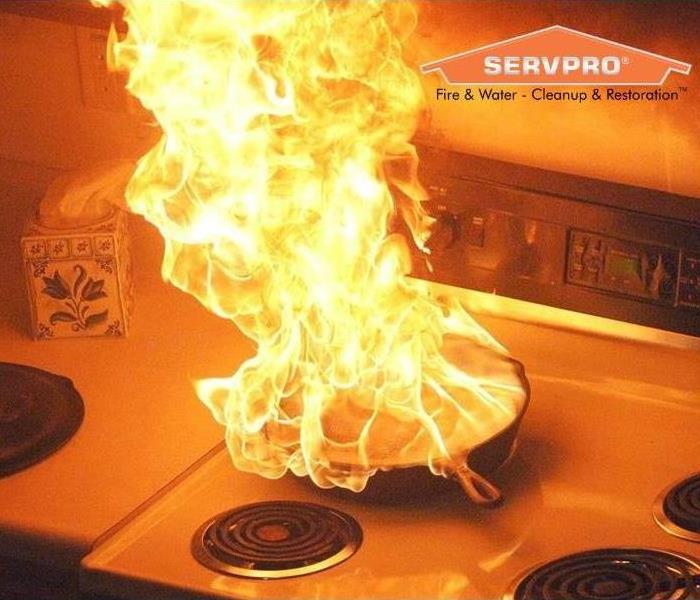 Pan fire
Pan fire
November brings families together in celebration of Thanksgiving. Most traditions include preparing a spectacular feast however if safe cooking habits are not practiced, your holiday could become hazardous quickly. The number one cause of home fires and injuries are from cooking according to the National Fire Protection Association with the leading cause being UNATTENDED COOKING. It's important to be alert to prevent cooking fires.
- Be alert! If you are tired or consumed alcohol, Do NOT use the stove or stove top.
- Stay in the kitchen when frying, grilling, boiling, or broiling food.
- When simmering, baking, or roasting, check it regularly, remain in the kitchen while food
is cooking, and use a timer to remind you that you are cooking. - Keep oven mitts, wooden utensils, food packaging, towels and curtains away from the stove top.
If you have a cooking fire, following safety protocols to help keep you and your family safe.
- Get out and close the door behind you
to help contain the fire. - Call 9-1-1.
- Oven fire, turn off the heat and keep the door closed.
- If you try to fight the fire, be sure others are getting out and you have a clear way out.
- Keep a lid nearby when you’re cooking to smother small grease fires. Smother the fire by sliding the lid over the pan and turn off
the stove top. Leave the pan covered until it is completely cooled. Do not try to move the pan off the stove.
SERVPRO® of Muskegon Professionals wish you a safe and happy holiday season.
Dangers of Deep Frying a Turkey
11/10/2017 (Permalink)
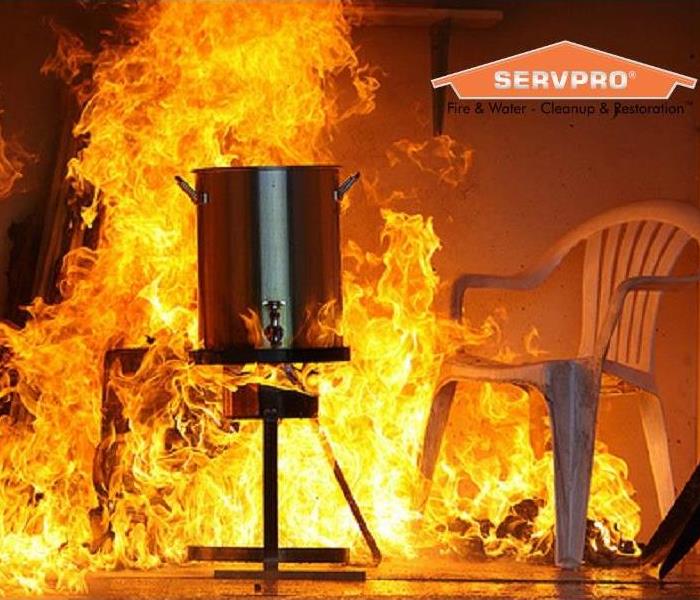 Deep Fry Turkey Fire
Deep Fry Turkey Fire
Thinking about Deep-Fried Turkey this holiday season? Although it's delicious, the big question you should as yourself, "Is it worth it?". There are numerous videos online of turkey fryer fires and explosions. Do you want to risk bodily injury or property damage?
- Place fryer on level surface away from structures and trees, fryers can tip easily.
- Do not use fryer in a garage or on a deck.
- Never use a fryer in the rain or while it's snowing.
- Overfilling the cooking pot will cause the cooking oil to overflow when the turkey is put in. 8-10 lb turkeys work best.
- A partially frozen turkey will cause cooking oil to splatter when put in the pot. Make sure turkey is thawed and dry.
- A small amount of cooking oil spilling on a hot burner can cause a large fire.
- Without thermostat controls, deep fryers can overheat oil to the point of starting a fire. If oil is at its smoking point, turn the fryer off.
- The sides of the cooking pot, lid, and pot handles can get dangerously hot. Avoid trying to move once fryer is in use.
- Never leave fryers unattended.
What's your Fire Escape Plan?
4/18/2017 (Permalink)
When there is an emergency situation, like a building fire, every second counts. The more prepared you are before the emergency determines how quickly you respond. Emergency planning and training is a direct influence on the outcome of an emergency situation. Facilities with well-prepared employees and well-developed plans will likely have less structural damage and fewer employee injuries.
It is important to designate multiple evacuation routes and exits when preparing a fire evacuation plan. This directs individuals to more than one way to exit the building, should an exit be blocked by fire. When choosing emergency exits, consider the following recommendations.
- Exits should be clearly marked and well lit.
- Exit routes should be wide enough to accommodate the number/volume of evacuating personnel.
- Exit routes should remain unobstructed and clear of debris at all times.
When preparing drawings that show evacuation routes and exits, be sure to post them for all employees to see. Escape plan should be practiced to help familiarize staff with emergency exit routes. The National Fire Protection Agency (NFPA) recommends practicing fire and emergency evacuations at least twice a year. Talk to your local fire department, as local codes may require more frequent drills for various facilities.
SERVPRO of Holland/W. Ottawa Co. can help with emergency planning by creating an Emergency READY Profile® (ERP) for your facility. For more information about the ERP or emergency planning, contact SERVPRO of Holland/W. Ottawa Co. 616-396-8180
Fire Escape Safety Tips
- Make a plan. Remember, every second counts.
- Practice your plan. Make sure you, your
employees and your family know the escape routes from every area of your home or business. Practice leaving the property with your eyes closed, feeling your way out.
- Leave immediately. Don’t stop for possessions or keepsakes. Exit as quickly as possible. If the smoke has already grown thick, crawl low and cover your mouth to avoid smoke inhalation.
- Never open doors if they are hot to the touch. When you come to a closed door, use the back of your hand to see if the door is hot to the touch. If it appears the fire is on the other side of the door, leave it shut and find another escape route.
- Designate an outside meeting place. Designate a meeting location away from the building. Take attendance to ensure everyone is accounted for and safely evacuated.
Risky Business Eliminating Electrical Fires
3/30/2017 (Permalink)
Working with electricity can be dangerous. Engineers, electricians, and other professionals who work with electricity directly have an increased risk of electrical related injuries. Other professionals, such as office workers and sales people who work with electricity indirectly, may also be exposed to electrical hazards. Electricity and electrical products play a key role in how we conduct business every day. It is important to use electricity properly to avoid serious safety risks.
According to the Electrical Safety Foundation, over the last ten years, more than 30,000 workers have been injured in workplace electrical accidents. Electrical fires can result from electrical system failures, but many more are caused by incorrectly installed wiring, overloaded circuits and improperly used extension cords.
Most electrically-related fatalities and injuries could easily be avoided. Take safety precautions to prevent electrical fire hazards by routinely checking electrical appliances and wiring. Buy electrical products evaluated by a nationally recognized laboratory, such as Underwriters Laboratories (UL). Consider unplugging electrical devices when not in use. Use extension cords wisely; never overload extension cords or wall sockets. Take steps to protect yourself everyday and make safety an integral part of how you do business.
DID YOU KNOW?
- Electrical hazards cause more than 300
deaths and 4,000 injuries in the workplace each year.
- Electrical accidents rank sixth among all types of work-related deaths in the United States.
- Electrical accidents on the job cause an
average of 13 days away from work and nearly one fatality every day.
- The non-fatal workplace incidents that cause the highest number of days away from work include contact with an electrical current or a machine, tool, appliance or light fixture (38 percent) and contact with wiring, transformers or other electrical components (33 percent).
- Nonfatal electrical injury occurs most often to those who work with machines or tools and around electrical wiring other than power lines.
- Over the last 10 years, more than 46,000 workers were injured from on-the-job electrical hazards.
*Facts and figures provided by the Electrical
Safety Foundation.
Destroy Odors with DEODORIZATION
3/21/2017 (Permalink)
Even a small fire can cause odors for years to come if the affected areas are not properly cleaned and deodorized. Fire, smoke and soot damage in your home or business can create unpleasant and potentially permanent problems.
As various materials burn, the smoke produced travels throughout the structure, leaving odorous residues and deposits on surfaces and in hard-to-reach places. Unless fast, professional action is taken, these residues and deposits can cause permanent damage to contents and may result in resurfacing odors.
Other odors that may require deodorization:
- Cigarette Smoke
- Pet Odors
- Decomposition
- Mold
With technicians certified by the Institute of Inspection, Cleaning and Restoration (IICRC), SERVPRO of Holland/W. Ottawa Co. Professionals provide specialized services that can rid your home or business of offensive odors left by fire or smoke damage. SERVPRO of Holland/W. Ottawa Co. Professionals do not cover up lingering odors with fragrance; they seek out and remove the sources of the odor. Once the source is found, SERVPRO's own proprietary line of cleaning products are used to treat and prevent the odor from returning. Any restorable item in affected areas will also be professionally cleaned and deodorized, including furniture, draperies, upholstery, electronics, art, flooring, walls, ceilings, and more.
Ask SERVPRO of Holland/W. Ottawa Co. Professionals to explain the various deodorization methods available and which will work best for you.
If you or a customer suffer a fire damage or some other accident and require deodorization services, contact SERVPRO of Holland/W. Ottawa Co. Whether it's fire, water, mold damage or just a stubborn odor that refuses to go away, we'll help make it "Like it never even happened".
Portable FIRE EXTINGUISHERS
3/16/2017 (Permalink)
Portable fire extinguishers can be life and property saving tool when used correctly. In order to operate an extinguisher, the National Fire Protection Association (NFPA) suggests remembering the word PASS:
- Pull the pin. Hold the nozzle pointing away from you and release the locking mechanism.
- Aim low. Point the extinguisher at the base of the fire.
- Squeeze the lever slowly and evenly.
- Sweep the nozzle from side-to-side.
Read the instructions on the fire extinguisher and become familiar with them before a fire breaks out. Remember, extinguishers do have limitations. It is also important to ensure you have the correct type of extinguisher for your facility. To find more information on choosing the
appropriate class of extinguisher, please visit the NFPA website at nfpa.org.
The First 48 Hours After a Fire
2/8/2017 (Permalink)
The first 48 hours after a fire damage can make the difference between restoring versus replacing damaged property and personal belongings. Rapid response and timely mitigation can help prevent fire damage from creating long term problems.
SERVPRO Professionals understand returning to normal is your primary concern. SERVPRO Response Teams are trained in caring for both you and your property. By responding quickly with a full line of fire cleanup and restoration services, SERVPRO of Muskegon & Holland/W. Ottawa Co. can help you get your home or business back up and running quickly and help protect your property and belongings.
If your home or business suffers a fire damage, contact us to help make it “Like it never even happened.”
Emergency Fire Damage Tips
DO
- Limit movement in the home to prevent soot particles from being embedded into carpet and avoid tracking.
- Keep hands clean. Soot on hands can further soil upholstery, walls, and woodwork.
- If electricity is off, empty freezer and refrigerator completely and prop doors open to help prevent odor.
- Wipe soot from metal kitchen and bathroom faucets, trim, and appliances.
- If heat is off during winter, pour RV antifreeze in sinks, toilet bowls, holding tanks, and tubs to avoid freezing pipes and fixtures.
- Remove soot particles from plants with a damp cloth.
- Change HVAC filter, but leave system off until a trained professional can check the system.
- Tape double layers of cheesecloth over air registers to stop particles of soot from getting in or out of the HVAC system.
DON’T:
- Don’t attempt to wash any walls or painted surfaces without first contacting SERVPRO Professional.
- Don’t attempt to shampoo carpet, rugs, or upholstered furniture without first consulting your SERVPRO Professional.
- Don’t attempt to clean any electrical appliances (TV sets, radios, etc.) that may have been close to fire, heat, or water without first consulting an authorized repair service.
- Don’t consume any food or beverages that may have been stored close to fire, heat, or water. (They may be contaminated.)
- Don’t turn on ceiling fixtures if ceiling is wet. Wiring may be wet or damaged and cause electrical shock, and air movement may create secondary damage.
- Don’t send garments to the dry cleaner. Improper cleaning may set in smoke odor.
When fire and water damage take control of your life, SERVPRO of Muskegon & Holland/W. Ottawa Co. will help you take it back.
Puff Back? What's That?
2/1/2017 (Permalink)
Furnace 'puff backs' occur most often in the winter. A puff back is a misfiring of your furnace that can send soot throughout your home, covering furniture, cabinets, walls, linens and everything in between. The consequences can be severe but SERVPRO of Muskegon & Holland/W. Ottawa Co. can work closely with you in the cleaning and restoration of your home or business.
How Does a Puff Back Occur?
A puff back happens when an oil burner doesn't ignite immediately and oil fumes are allowed to build up resulting in an explosion similar to the backfiring of a car. The explosion can shoot soot and debris through the furnace or boiler's exhaust system throughout your home.
The soot is not just a powder-like substance, but is black and sticky and will include a mixture of oil that is difficult to clean. The first thing you should do is contact your insurance company to start a claim, which will usually cover your home and contents affected by the puff back (calling your insurance carrier should always be the first step to see if you have coverage. Understanding your coverage should be a high priority for any home or business owner).
What Should You Do?
Here are some helpful tips on what you should do, should a puff back occur in your home:
- Assess the situation and the amount of damage that was done.
- Wash all affected clothing and fabrics in the house - some may require professional cleaning.
- Throw away all exposed foods.
- Call a repairman to fix the malfunctioning furnace.
- Call SERVPRO of Muskegon & Holland/W. Ottawa Co. to take care of the cleaning of the soot and chemicals.
We will work closely with you, your insurance agency and your adjuster to ensure that the job is done as quickly as possible to get you back to your normal, daily routine.
How to Prevent Puff Backs
- There are a few steps you can take to prevent puff backs:
- Keep your oil heating system free of dust
- Inspect and service your heating system yearly
- If you hear noises or see soot near your furnace, call your heating company
Your homeowners policy will usually cover damage to your home caused by a puff back. However, the cost to repair the furnace would most likely not be covered as it is most likely a maintenance issue. If a puff back occurs, we recommend that you do not attempt to clean it yourself. Using standard cleaning products could cause further damage and may not get rid of the oil residue and odors. The cost of hiring SERVPRO of Muskegon & Holland/W. Ottawa Co. and other related expenses would be covered as part of the claim and are subject to the policy deductible.
Alternative Heating Safety Tips
1/27/2017 (Permalink)
The winter season is here and with it comes shorter days and lower temperatures. No matter where you live, winter brings a change in the weather. Many people use alternative heat sources like fireplaces, portable space heaters, and wood burning stoves to help keep homes cozy. Did you know, heating equipment is a leading cause of home fire deaths? According to the National Fire Protection Association, heating equipment fires cause an estimated $1 billion in direct property damage annually. Keep the following safety tips in mind to help reduce your risk of a heating-related fire.
- Keep anything flammable at least three feet away from heating equipment, like the furnace, fireplace, wood stove, or a portable space heater. Have a three foot “kid-free zone” around open fires and space heaters.
- Make sure the fireplace has a sturdy screen to stop sparks from flying into the room. Ashes should be cool before putting them in a metal container. Keep the container a safe distance away from your home.
- Remember to turn portable heaters off when leaving the room or going to bed.
- Test smoke alarms monthly.
- Always use the right kind of fuel, specified by the manufacturer, for fuel burning space heaters.
- Have heating equipment and chimneys cleaned and inspected every year by a qualified professional. If your property does suffer fire damage, contact your SERVPRO of Muskegon & Holland/W. Ottawa Co. to help make it “Like it never even happened.”
Smoke Alarms: LIFE SAVERS
1/27/2017 (Permalink)
Smoke alarms save lives when properly installed and maintained, according to the National Fire Protection Association (NFPA).
In homes, smoke alarms should be in every bedroom and on every level, including the basement. In office and commercial environments, check your state requirements or contact your local Fire Marshall to help ensure all codes are met.
Test smoke alarms monthly using the test button. Smoke alarms with non-replaceable batteries need the entire smoke alarm unit replaced every ten years. Other alarms need batteries replaced every year, and the unit replaced every ten years. If the alarm chirps signaling low battery, take the proper steps to replace the unit or the batteries immediately. Never disable or remove the battery from an alarm. Almost half of fires where smoke alarms were present but did not activate had missing or disconnected batteries (NFPA).
In larger commercial facilities, hard wired or wireless smoke alarms offer benefits such as not needing to be tested
as often and activating throughout the entire building if smoke is detected in just one area (NFPA).
If you need help installing, testing or changing batteries in your smoke alarms, contact your local fire department, an electrician or the American Red Cross.
Be sure your home or workplace has a fire emergency plan in place and conduct regular fire drills. For more information
on Emergency Preparedness, contact your local SERVPRO of Muskegon & Holland/W. Ottawa Co.
FIRE FACTS:
7 People die every day from a home fire.
36 People suffer injuries as a result of home fires every day.
$7 BILLION in property damage occurs every year.
Cook the Turkey Not the Garage in Ottawa County
11/17/2016 (Permalink)
Each November, families gather to celebrate Thanksgiving by preparing a delicious feast but if you don't practice safe cooking habits, your happy holiday could become hazardous very quickly. According to the National Fire Protection Agency (NFPA), cooking is the main cause for home fires and injuries with Thanksgiving being the peak day for cooking-related fires. Review the following safety tips to ensure you can enjoy a safe holiday. Click here to see a scary demonstration of how quickly a food related fire can get started.
- Never leave cooking food unattended-stay in the kitchen when frying, grilling, or broiling food. If someone must leave the kitchen for even a short period of time they should turn off the stove.
- Check food regularly while cooking and remain in the home while cooking. Use a timer as a reminder that the stove or oven is on.
- Keep the kids away from the cooking area. Enforce a "kid free zone" and make them stay at least three feet away from the stove
- Keep anything flammable; pot holders, oven mitts, wooden utensils, paper or plastic bags, food packaging, and towels or curtains away from the stove, oven or any other appliance in the kitchen that generates heat.
- Do Not wear loose clothing or dangling sleeves while cooking
- Clean cooking surfaces on a regular basis to prevent grease buildup.
- Purchase a fire extinguisher to keep in the kitchen. Contact your local fire department for training on the proper use of extinguishers. (click here)
- Always check the kitchen before going to bed or leaving the home to make sure all stoves, ovens, and small appliances are turned off.
Install smoke alarms near the kitchen, on each level of the home or business, near sleeping areas, and inside and outside bedrooms. Use the test button to check it each month. Replace all batteries at least once a year.
SERVPRO of Muskegon and Holland/ W. Ottawa County wishes your a safe and happy holiday season.
First 24 Hours After A Fire
7/27/2016 (Permalink)
The first 24 hours after fire damage can make the difference between restoring versus replacing your property and personal belongings. SERVPRO's 1-4-8 Service Response Guidelines can help prevent fire damage from creating long term problems.
Under normal circumstances, within one hour from notice of loss, a SERVPRO of Muskegon and Holland/W. Ottawa County Professional will contact you to arrange for service. Within four hours of loss notification our crew will be on site to begin mitigation services. Finally, within eight business hours, a verbal job briefing will be communicated to the appropriate party.
SERVPRO of Muskegon and Holland/W. Ottawa County professionals provide timely response with mitigation services ranging from fire, smoke and soot removal to contents claims inventory and document restoration. These services help ensure ensure your property and belongings are restored to pre-loss condition when possible.
Professionals from SERVPRO are available 24hours a day, 365 days a year to help you make it "like it never even happened."
If you or your neighbor down the street suffers a fire whether at home or at the business, remember the following tips to help minimize damage while waiting for help to arrive.
What to Do Until Help Arrives
- Wipe soot from chrome on faucets, and appliances then protect with a light coating of petroleum jelly or oil.
- Do not attempt to wash any walls or painted surfaces.
- Do not attempt to shampoo carpet or upholstered furniture.
- Do not attempt to clean any electrical appliances that may have been close to fire or water without consulting a repair service.
If you follow these tips, and contact SERVPRO of Muskegon, and Holland/W. Ottawa County right away you greatly reduce the claim. Please post any questions you may have in the comments.
The Behavior of Smoke
6/15/2016 (Permalink)
A fire loss can result in complex damages because of the unique behavior of smoke. A trained professional should survey the loss site to determine the extent to which fire, smoke, heat, and moisture impacted building materials and contents.
SERVPRO of Muskegon and Holland/W. Ottawa Co. professionals know smoke can penetrate various cavities within the structure, causing hidden damage and odor. Our knowledge of building systems helps us investigate how far smoke may have spread. Here are some facts you may not know about smoke:
- Hot smoke migrates to cooler areas and upper levels of a structure.
- Smoke flows around plumbing systems, seeping through the holes used by pipes to go from floor to floor.
- The type of smoke may greatly affect the restoration process.
The Different Types of Smoke
There are two different types of smoke, wet and dry. As a result, there are different types of soot residue after a fire. Before restoration begins, a professional from SERVPRO of Muskegon and Holland/W. Ottawa Co. will test the soot to determine which type of smoke damage occurred. The cleaning procedure will then be based on the information identified during pretesting. Here is some additional information regarding the various types of smoke.
Wet Smoke (Plastic and Rubber)
Low heat, smoldering, pungent odor, sticky, smeary. Smoke webs are more difficult to clean.
Dry Smoke (Paper and Wood)
Fast burning, high temperatures, heat rises therefore smoke rises.
Protein Fire Residue (Produced by evaporation of material rather than from fire)
Virtually invisible, discolors paints and varnishes, extreme pungent odor.
Fuel Oil Soot (Furnace Puff Backs)
While "puff backs" can create havoc for homeowners, SERVPRO professionals can, in most cases, restore the contents and structure quickly.
Other Types (Tear gas, fingerprint powder, and fire extinguisher) Special situation that requires special care.
Our professionals are trained to handle even the toughest losses. If your home or business sustains fire or smoke damage, contact SERVPRO Muskegon and Holland/W. Ottawa Co. Professionals to help make it "Like it never even happened".
Electrical Safety in the Office and at Home
5/18/2016 (Permalink)
Electrical outlets can become dangerous when overloaded. Though it may be easy to simply plug in another power strip or extension cord when adding equipment, the wiring in some buildings often isn't capable of supporting to many high powered electronics appliances. Older office buildings and homes, in particular, often suffer from lack of electrical outlets. The temptation is to simply add a power strip or plug in an extension cord from across the room. Even in newer office buildings and homes, it can be all too easy to overload a single outlet with power hungry machines such as computers, printers, scanners, and monitors.
So what's the big deal?
When an employee or residents overloads an electrical outlet, that means more current is running through the outlet than it can handle. This causes the outlet to overheat, which may lead to an electrical fire. According to the National Fire Protection Agency (NFPA), electrical distribution and lighting equipment are involved in more than 24,000 home structure fires per year. These fires result in an average of 320 deaths per year and an estimated $700 Million in property damage per year.
- If an electrical find should occur in your office or home, get safely away from the fire an call the fire department immediately. If you choose to use an extinguisher on the fire, never let the fire get between you and a safe exit, and never use water to extinguish an electrical fire. The risk of electrical shock is far to great. Class C fire extinguishers use a non conductive extinguishing agent and should not cause electrical shock.
To help prevent this and other electrical hazards, refer to the list below (provided by Electrical Safety Foundation International).
- If you use a power strip, use a name brand product from a reputable retailer. Low quality or counterfeit power strips may contain wiring that isn't adequate to carry the load.
- Place power strips where there is plenty of air circulation to disperse the heat.
- Never attempt to plug grounded (three pronged) cords into an ungrounded (two pronge) outlet.
- Do not bind, kink, or knot electrical cords.
- Keep cords close to a wall to prevent the risk of tripping.
And as always should you or someone you know experience a loss due to an electrical fire, call the cleanup team that is faster to any disaster. SERVPRO of Muskegon and Holland/ W. Ottawa Co. is ready to make it like it never even happened. For a full list of services visit our websiteswww.SERVPROmuskegon.com or www.SERVPROhollandwestottawacounty.com

 24/7 Emergency Service
24/7 Emergency Service















